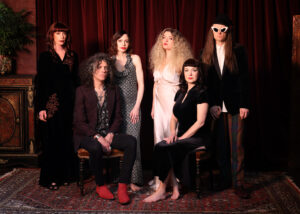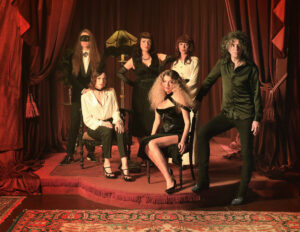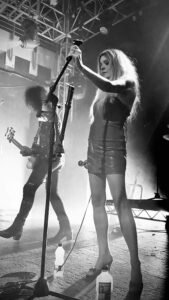In 1991, the popular label dedicated especially to electronic music, Mute Records, released an EP of madrigals, that is, secular vocal music, often in Italian, typical of the Renaissance. The authors of Madra were three English students, who used to busk in the streets of Lodon and answered to the name of Miranda Sex Garden. The band evolved as they added a drummer and a guitarist and approached a rather peculiar gothic rock. After a more than two-decade hiatus, they recently returned and will be giving one of their first concerts outside England on 11st of May at the DarkMad festival.
Cover photo: Janice Issitt

Photo: Janice Issitt
—The name of the band comes from The Ticket That Exploded, a book by William S. Burroughs. In the book it appears as Miranda – Sex Garden, what called your attention of these three words together? Who chose the name?
—The name was chosen by an unknown person, a friend of our agent back in 1989. We were about to do an a cappella show at The Cricketers in south London. We didn’t have a name and we were about to go on stage. Our agent showed us a list of suggestions. The only other one I remember was ‘White Russia’.
—The three members of the band used to sing Madrigals in the street for three years. Apart from meeting Barry Adamson that is the subject of our next question, did you experience any funny stories during these days?
—We would busk all over the place. In the tunnels in the tube, in the tunnels going to the museums in South Kensington, in an arcade in South Kensington and famously at the Portobello Rd Antique Market. Busking back in those days was technically illegal on the underground. When we saw the London Transport police coming down an escalator or along the tunnels, we would grab our hat with the money in and run off. When I was busking alone once with my recorder I actually got arrested. I was read my rights. As I was only 16, my mum had to come along with me when I got a caution. They described my instrument as a flute. I said: -“It’s not a flute, it’s a sopranino recorder”. My mum thought it was a hilarious and ridiculous that I was being cautioned over something so innocent. She couldn’t stop laughing.
—How was meeting Barry Adamson and recording with him?
—We were approached by Barry Adamson busking on the Portobello Rd. He didn’t say much, just that he wanted us to sing on his soundtrack. We hadn’t heard of Mute Records or Barry Adamson back then. He left us his number and we got in touch. Shortly afterwards we were lucky enough to be recording at Worldwide Studios and offered a record deal by Daniel Miller.

Photo: Janice Issitt
—How was being part of Mute, especially in your case that you were not a pop/electronic band? The remixes of “Gush Forth My Tears” were an effort to get into the fans of the label or you just took advantage of being there? Did you like it at the time?
—It was our idea to do the remix. We were pretty gutted when Enigma brought out a track using monks singing plainsong in a remixed style just a couple of weeks before.
—I guess it was quite original to release an album of 16th century madrigals in a pop context. How was your first album perceived at the time?
—It was very well received as an album. Less so when we supported Blur at the Astoria and people started throwing bottles at us!
—What were your interests in music back at the time?
—The original line up Kelly McCusker, Jocelyn West and I, who all met at The Purcell School of Music. We were all obsessed with Prince at the time. We would sing a cappella version of his track “Under the Cherry Moon”, which sadly we never recorded.
—What happened from Madra to Iris that the band changed so much? Why did you add a drummer and a guitar player?
—I was living in a shared house with guitarist and drummer Ben Golomstock and Trevor Sharpe at the time. I got them involved as an experiment which resulted in the band morphing into an avant-garde goth rock band. A very unlikely but surprisingly successful turn of events.
—Why the name of for the second album? Do you like the Argento’s movie or the Goblin’s soundtrack?
 —Ben Golomstock was obsessed with horror films. His whole room was full of VHS videos. We thought the film Suspiria was so dark and beautiful.
—Ben Golomstock was obsessed with horror films. His whole room was full of VHS videos. We thought the film Suspiria was so dark and beautiful.
—Why the cover of “In Heaven”, a song that appears in David Lynch’s Eraserhead? Did you like the movie or just the dreamy atmosphere of the song?
—This was also Ben’s idea. He was obsessed with the dark and surreal atmosphere of David Lynch films. Jocelyn West went on to record an album with David Lynch, sing Hildegarde Von Bingen plainsong.
—At the end of 1993, Kelly McCusker left the band. Jocelyn West had left the year before, so I guess you remained at the helm of the band, Katharine. How did you feel? Was it difficult to continue without them?
—We were lucky enough to be joined by Donna McKevitt when Jocelyn left. Kelly was a college with her. She is an amazing singer, viola player and composer who massively influenced the band’s sound.
—The band had some “problems” opening for Depeche Mode and Blur as you commented before. That support bands were not well received was something popular in the past, but not so much nowadays. How do you remember opening for Martin Gore and David Grahan’s band?
—I really enjoyed the Depeche Mode tour. It was very intense, having a stadium full of people shouting and throwing stuff at you, but we had a PA. We were louder than them. We thrived on the conflict. It was novel and exciting. We would get lots of weird stuff thrown at us. Parma ham, gerkhins and on the final night in Berlin, a bag of shit, which Trevor threw back into the crowd. The they really went nuts when it burst. Extra security had to be called in.
—Simon Fisher-Turner selected your song for the soundtrack of Blue, the last short of Derek Jarman. Were you implied in any other way with the movie? Did you like it?
—It is an amazing film. I recently rewatched it when it was being shown at an exhibition at Somerset House called ‘The Horror Show’ a landmark exhibition that invited visitors to journey into the underbelly of Britain’s cultural psyche, which also featured Barry Adamson amongst many others. Donna McKevitt was very inspired by Derek Jarmen’s words and went on to record an entire album of his words set to music entitled Translucence.
—How do you think that touring with Einstürzende Neubauten influenced your third album. Alexander Hacke was the producer and F.M. Einheit played in Fairytales Of Slavery.
Alexander Hacke was the producer and F.M. Einheit played in Fairytales Of Slavery.
—Trevor was particularly influenced by EN’s sound. It inspired him to start using industrial percussion instruments such as an aluminium pole and gas cylinders which became a mainstay of his live performance and appeared all over FairyTales of Slavery and also on ‘Sex Garden’ the B Side of our new single Velventine.
—What happened in 1995 that MSG disbanded?
—We lost our record deal with Mute Records. We had had our every whim indulged for quite a few years. Someone was then brought in to get rid of the bands that were too expensive to run and weren’t making enough money and we were one of them.
—In 1999 the band re-formed with some new members and released their final album Carnival of Souls in 2000. Did you reunite just for the album? How was the situation inside the band at the time?
—We had written the songs for that album in the mid-90s. A few years later I was approached by a benefactor who worked for the BBC who funded the recording of the album. This was SugarDaddy Records.
—What do you think now of Carnival of Soul? Do you think that it deserved a better luck? There was not a lot of publicity and gigs, right?
—It is my favourite album by the band, and the album which we play the most songs from live. The songs are now certainly getting the exposure they deserve.
—You collaborated in Ben Golomstock’s album Stories From the Moon from 2006. How do you remember your late guitar player?
—He was a totally unique character; I first met him at college when I was 17. He introduced me to so many cool things, music, films and generally the weird and wonderful side of life that I hadn’t experienced in my formal education studying classical music.
—What made Miranda Sex Garden come back after a 22-year hiatus?
—Trevor, who I had lost contact with for quite a few years, got in touch with this crazy plan. We started rehearsing before lockdown, and then everything went on hold. Trevor got long covid, but was determined to start drumming again as soon as he was able. Our reunion sold-out show at the 100 Club was certainly a night to remember. It was unbelievably thrilling to be performing in that style again after so many years doing classical/folk type performances with Mediæval Bæbes.
— What can you please tell us of your last Velventine EP? Both songs are from 2000, right?
What can you please tell us of your last Velventine EP? Both songs are from 2000, right?
—It has been extremely difficult to complete Velventine, but I am delighted with the finished result. I had the original project stored on discs in a very old version of logic. I had to rebuild the track from scratch from raw files/performances as the project was too old to open. It was a very emotional journey as these ancient files featured the guitars of Ben Golomstock, and would be the last time we ‘worked’ together. I wove his guitars into performances by the current band, which was very challenging whilst working with partially recovered files. “Sex Garden” was also recorded around this time, but in this case, we had a completed mix.
—Time for some side-project questions. Mediæval Bæbes, in a way, kept the vibe of MSG and it’s the most popular of them. You started it during the first stop of MSG, what can you please tell us of your second most famous band?
—I had always loved working with vocal harmonies, like in the earlier days of MSG. Mediaeval Baebes has been the perfect vehicle for me to explore and expand on my choral writing and arrangement.
—How was finishing Waltzing Bones, the last album by your late husband Nick Marsh? With him you also recorded From The Deep, right?
—From the Deep was released after Nick died. It has been so very heart rending having to release it without him, that it took a few years for me to feel strong enough to go back into the projects that would become his final solo album. I knew it was what he would have wanted, and I like to think he would have loved the finished result. It features many guest performances from friends and musicians who loved him and collaborated with him before he died.
—And with Michael J. York (who collaborated with Coil and Current 93) you have another project that released an album last year, The Witching Tale. Do you plan to continue with this one more? How would you recommend the album to your MSG fans?
—Michael was fortunate enough to work with Coil in his early 20s which led to his involvement with other bands from the Coil diaspora; Cyclobe and latterly Current 93. Coming, like me, from a classical background, this journey completely rewired his musical brain. His esoteric approach to composing with both synthesizers and acoustic folk instruments is directly influenced by his time working with these innovative artists. It’s been fantastic to marry my more exacting compositional and production approach with these other-dimensional soundscapes. We’ve created two albums so far and last year started performing live, there will be many more albums and shows in the future!
—One thing that surprise me is that you have always tried to work with the same musicians. Do you like your bands to be like a family?
—Having worked so well with Kavus Torabi and Bev Lee Harling in Mediæval Bæbes, it was an obvious way forward to get them into MSG to replace Ben and Donna.
—What are the plans of the band for the future? Maybe a new album?
—We have started writing the next album, and we will be performing new material on this coming tour.
—What can we expect of your concert at DarkMad?
—As our first overseas gig in many years, I’m sure the atmosphere will be electrifying. We can’t wait!!!



